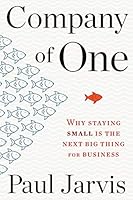Highlights from "Company of One"
By Paul Jarvis

Yet we soon learned that living in the woods on an island does something funny — it forces you to go deep within your own thoughts.
By decluttering my thoughts (creating an “inbox zero” for my brain, if you will), I was able to look at my day-to-day business much more clearly because the distractions were now gone.
He had figured out the amount of wealth he needed to be comfortable and didn’t feel the need to accumulate more. Past that, he didn’t need any more money — so he’d stop working when he hit his “enough” amount and travel for the rest of the year.
Just as Michael Pollan’s food ideology is summarized in three simple rules — “eat food, not too much, mostly plants” — the “company of one” model can be laid out in a similar fashion: “start small, define growth, and keep learning.”
Bigger houses, faster cars, more stuff to pack into our closets, garages, and then, inevitably, our storage lockers. But under this hype, this fetishization of wanting more, are empty promises of happiness and fulfillment that never seem to come to fruition. Sometimes “enough” or even less is all we need, since “more” too often equates to more stress, more problems, and more responsibilities in both life and business.
As much as I enjoy growing my wealth, I also realize that there’s a point of diminishing returns if I don’t also take care of myself and my well-being.
Being or becoming a company of one has a lot to do with resilience: the capacity and fortitude to recover quickly from difficulties — like a changing job market, or being fired.
The first trait that resilient people have is an acceptance of reality.
The second characteristic of resilient people is a sense of purpose — being motivated by a sense of meaning rather than by just money.
The last trait of resilient people in a company of one is the ability to adapt when things change — because they invariably do.
Basically, you have to be good at your skill set before you can expect to achieve autonomy from using it.
Whereas most normal corporate workers can be hyperfocused on a single skill, companies of one, even within a larger business, need to be generalists who are good at several things — often all at once.
This is the concept at work in the ROWE method: employees no longer have to work a set amount of time, but are rewarded when they finish their tasks faster. By being smarter at getting more work done faster when you work for yourself, you can create a more flexible schedule that fits work into your life in better ways.
Sean’s goal of achieving a target profit and not exceeding it comes from shaping his business around an optimal life he wants to lead — complete with taking a three-month vacation each year with his wife and spending hours walking, cooking, and teaching and tutoring his two young nieces each day.
For companies of one, the question is always what can I do to make my business better?, instead of what can I do to grow my business larger?
As much as we don’t want to be, or admit to being, guided by external factors and peer pressure in setting goals, to some degree we are. It’s good to feel accepted and valued by a group. If our goals were completely internalized at all times, we wouldn’t chase growth as much as we do.
But there is one way that envy can be useful: as a tool to recognize in ourselves what we truly value. For example, if I’m envious that you make more money than I do, then I need to recognize that making more money might be important to me, work toward figuring out if that’s truly the case, and then, if it is, determine how I can best make more of it. Once we learn what triggers our envy, we can focus on how to rethink or move forward.
Charisma — the so-called X-factor that leaders are supposed to be born with in order to make compelling pitches, inspire urgency, and encourage cooperation — isn’t an innate quality that you either have or don’t have. In fact, charisma can be taught or brought out when required, even in quiet individuals.
A study done by professors at Harvard Business School found that introverted leaders, especially when they are managing skilled and proactive teams, can be highly successful. That’s because a quieter, calmer leader is more likely to listen carefully, stay very focused, and not be afraid to work for long stretches of time without interruption. And they are able to lead a team of people who can do the same.
Being able to understand how others think is critically important to a company of one. You need to know how and why people make decisions about your products or services. What leads them to buy what you create? What makes them hesitate? Where do they place value in their lives? If they do buy from you, what is considered a win for them? Where does churn happen in your business and why?
The more we can learn about how to communicate clearly and effectively, the better we’ll be at leading, as our directives will be better understood.
When hustling turns sleeplessness into a badge of honor and work demands push health, family, and friends to the back burner, it’s definitely time to take a break.
hustlers don’t outperform nonhustlers; the only noticeable impact of their hustling is higher job stress, greater work-life conflict, and deteriorating health.
The more you get to know yourself, what your triggers are, and what personally drives you outside of external motivation, the more you can optimize a healthy role for yourself as a leader.